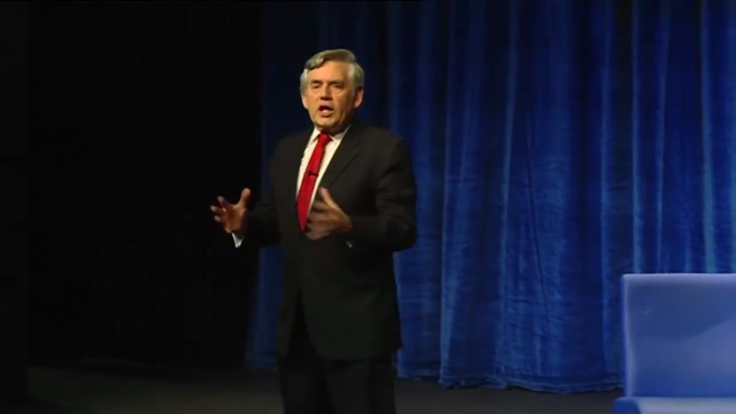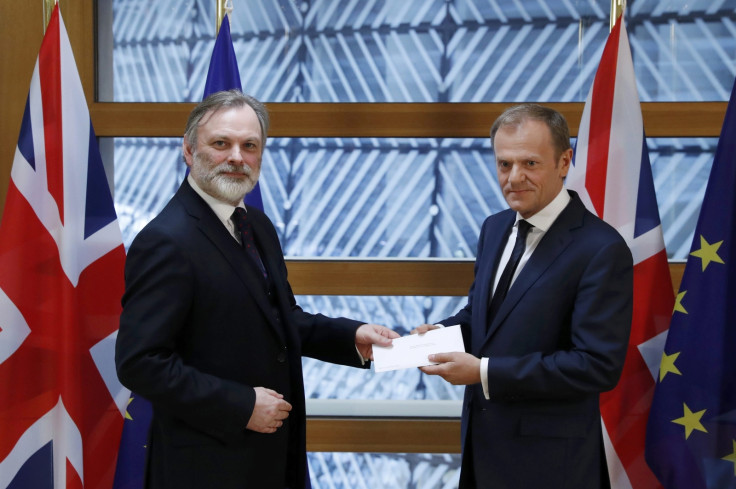Triggering Article 50: UK begins Brexit — as it happened
Live coverage of events as Britain begins the formal process of exiting the European Union.
The UK triggered Article 50 today (29 March) thereby beginning the formal process of leaving the European Union. At 12.30pm, Sir Tim Barrow, the British Ambassador to the EU, handed Donald Tusk a letter signed by Theresa May signalling the UK's desire to begin formal divorce proceedings.
IBTimes UK covered the events as they unfolded including a highly charged Prime Minister's Questions on the day that the UK turned its back on 44 years of EU membership.
Here are some key explainers giving context to the historic moment:
- The key players in the UK negotiating team
- What is the difference between a hard and soft Brexit?
- Who is Sir Tim Barrow? The man delivering the Article 50 notice
OUR TOP STORIES FROM TODAY:
- City reaction: "Hard work starts here"
- Theresa May admits UK will lose influence
- Pound surges after Britain triggers Article 50
- EU Council President Donald Tusk says: "We miss you already"
- Full text of the Article 50 letter
- EU chief negotiator Michel Barnier says he is "ready"
- Corbyn warns May of "historic national failure"
AS IT HAPPENED:
- Theresa May finishes taking questions on her statement — all 113 of them
- Donald Tusk responds to the Article 50 letter
- May tells the Commons: "There can be no turning back"
- Article 50 has been triggered, Britain is leaving the EU
- UKIP Deputy Leader speaks to IBTimesUK in Westminster
- Protesters start gathering outside Parliament
- Watch Sir Tim Barrow arrive in Brussels carrying the Article 50 letter
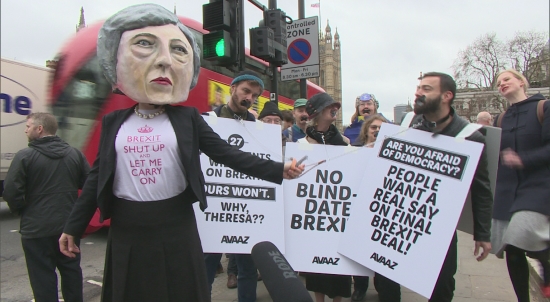
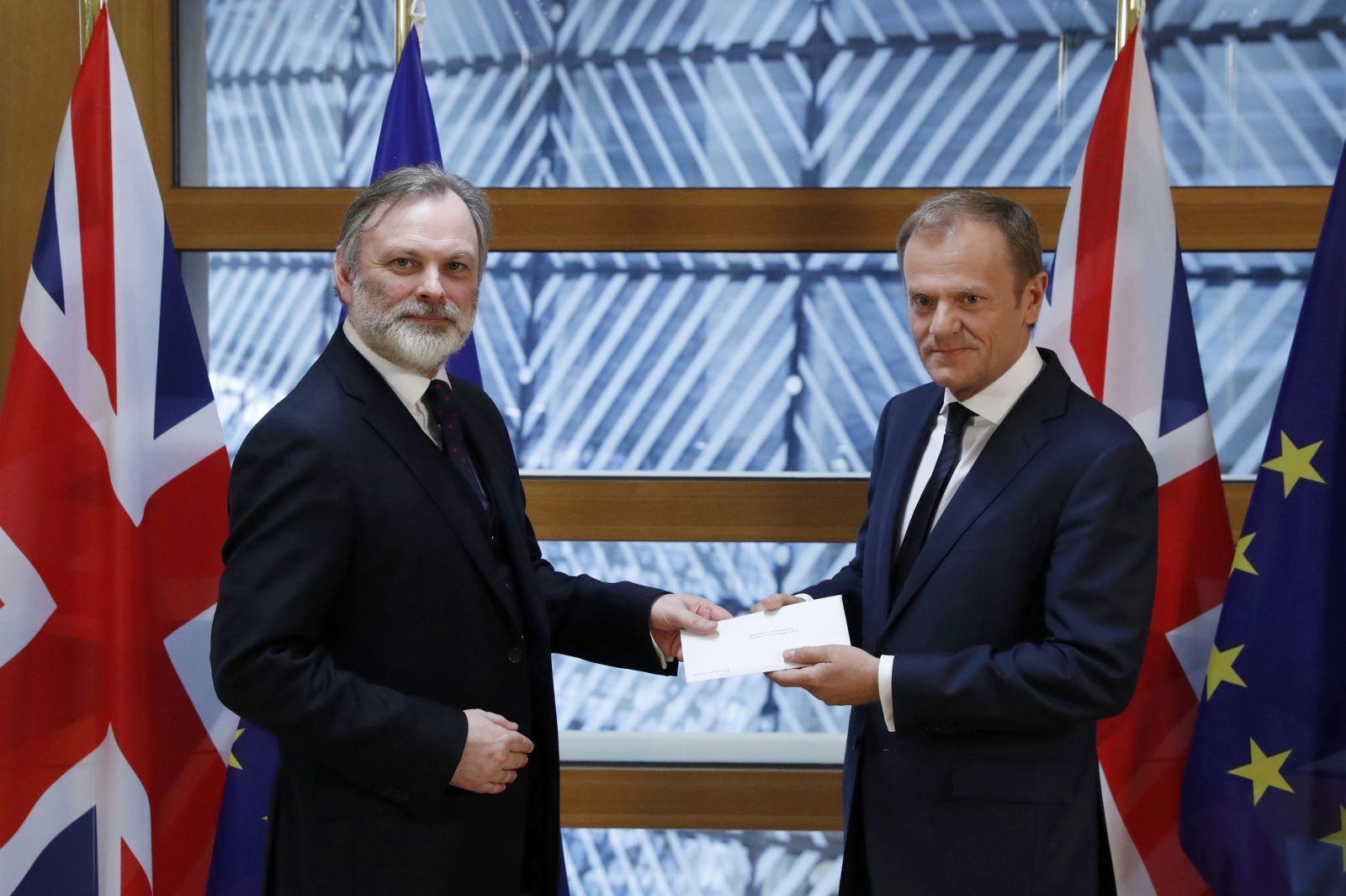
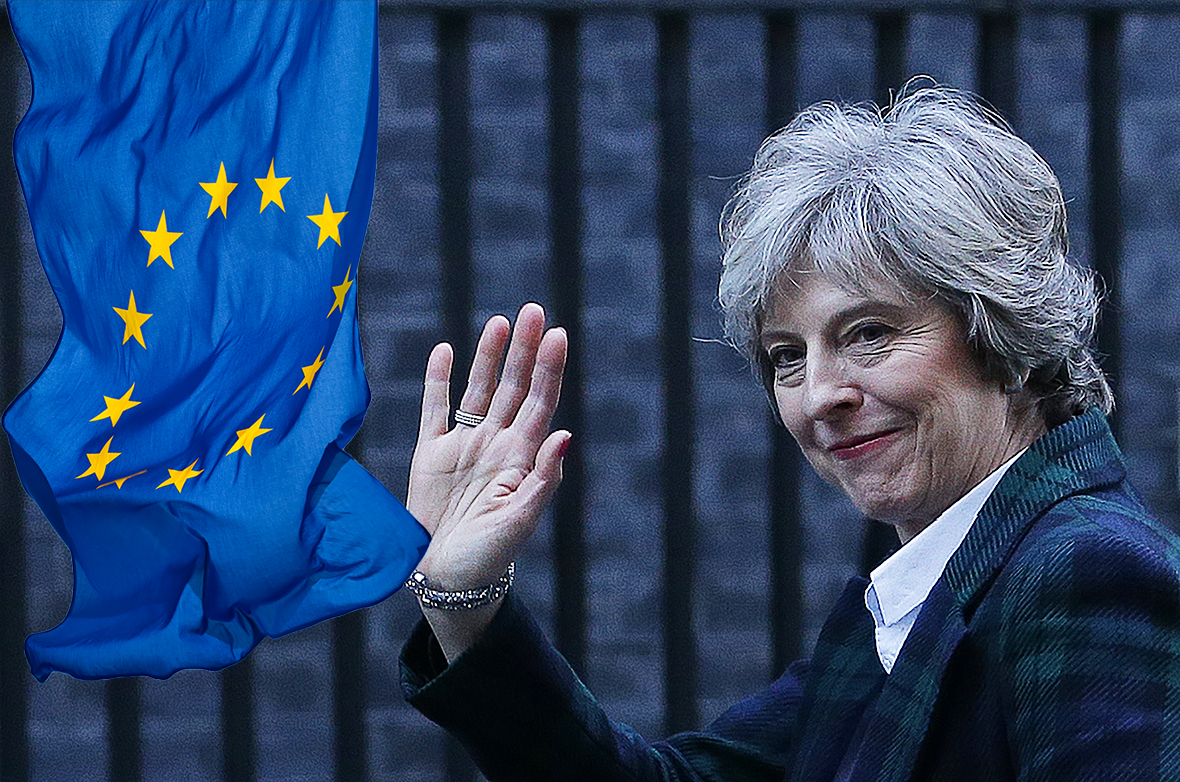
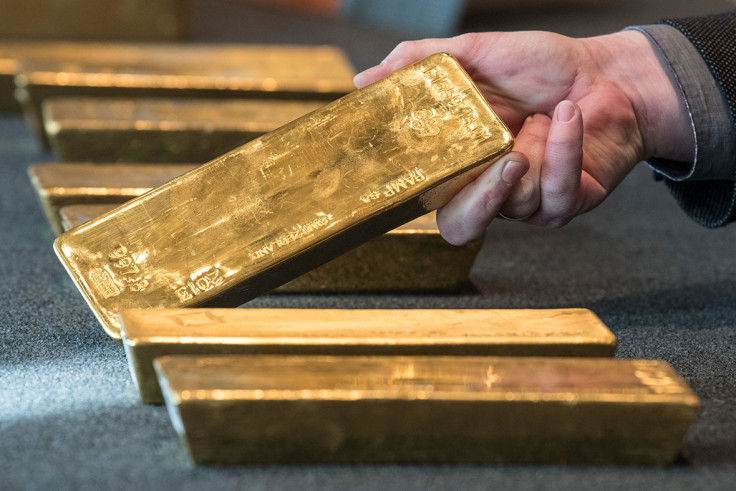
We're about to wrap up this live blog. It was the day that the UK triggered Article 50 and embarked on what Theresa May said she hoped would be "a smooth and orderly" divorce from the EU.
Our final pieces come from Business Editor Gaurav Sharma and Senior Correspondent Roger Baird.
Guarav reports that, contrary to expectations, the price of gold fell slightly in the immediate aftermath of Britain's declaration.
Roger covers City reaction to the Article 50 notice including Institute of Directors' Stephen Martin's assessment that "now the real work begins".
Thanks for joining us and remember to stay tuned to IBTimesUK over the next 24 months as Britain and the EU attempt to establish a new formal relationship.
We will be covering every twist and turn from the worlds of politics and business.
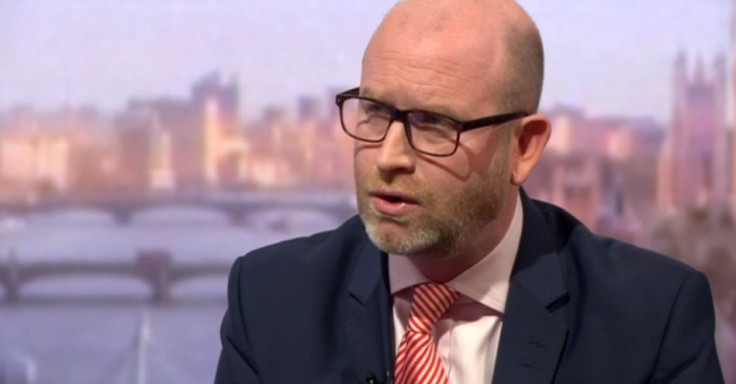
UKIP Leader Paul Nuttall has issued a statement in response to the triggering of Article 50. His comments echo those of his deputy, Peter Whittle, who spoke to IBTimesUK earlier today.
Nuttall said: "Today the Government will finally act on the historic decision of the people of this country to leave the European Union.
"Finally, nine months after our vote the UK will formally inform the EU that we are leaving.
"UKIP is delighted that this is eventually happening. 24 years ago this party was formed to make this a reality, so it would be churlish to complain. We have been ignored, dismissed insulted and abused, but through determination and with good humour we fought on and we have succeeded.
"The nine months delay has, of course cost the taxpayer additional billions, and has allowed those who would block the democratic will of the people to do all they can to spread discord, but we are here now.
"While negotiations continue we will continue to be the 'guard dogs of Brexit', holding the Government's feet to the fire at home and our MEPs will be working to ensure our friends on the continent do not pull any fast ones.
"We will provide the political threat to ensure no backsliding takes place and ensure that Brexit does indeed mean Exit.
"With our six key tests we have set out a reasonable and clear position by which the Government's negotiations can be held to account.
"But today, for now, we wish the Government and the Prime Minister well.
"If they fail in this historic task, 17 million people are ready to act."
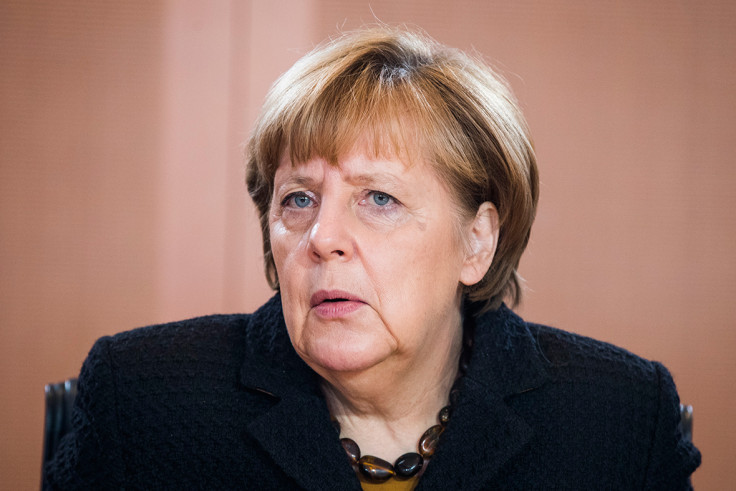
The Guardian is reporting that Angela Merkel has responded to the day's events. She said: "My wish is the Great Britain and the European remain close partners. Because for me the United Kingdom is and remains a part of Europe with which we have a lot in common, not least our common values.
"On the basis of these values, and with the help of fair rules we will strive for a balance of obligations and rights."
Our lead politics writer Ian Silvera has filed his main takeaway from May's speech today. Ian focuses on May's admission that Britain will "lose influence" outside the EU.

Our business desk have just passed across this analysis of London-listed companies' share prices in the wake of the Brexit referendum.
The analysis was provided by Hargreaves Lansdown and shows the firms suffering the heaviest fall in share price since the vote.
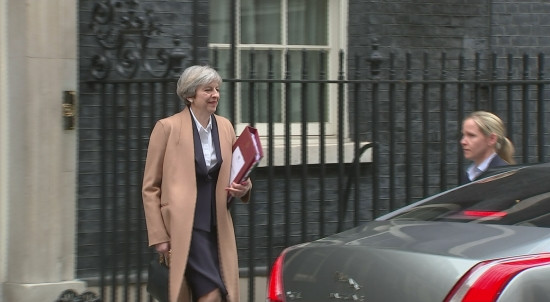
Theresa May has now finished taking questions from backbench MPs in response to her Article 50 statement. Speaker John Bercow notes that 113 of them took the opportunity to quiz the UK premier.
He said: "Can I thank the prime minister who has been with us for the last three hours and 21 minutes, and attending to this statement for the last two hours and 46 minutes. In the name of courtesy we ought to say a big 'thank you' to the prime minister."
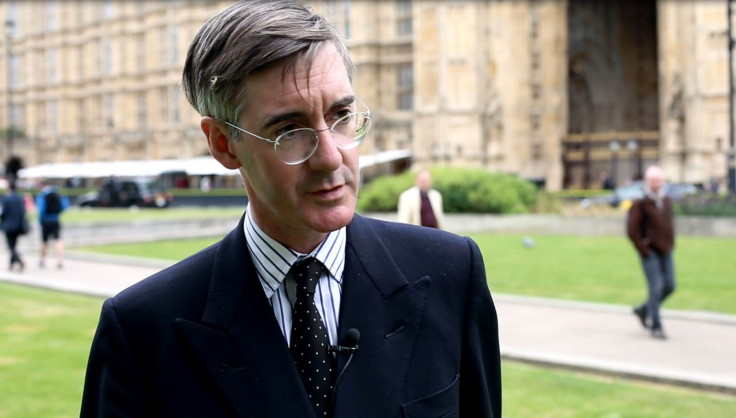
North East Somerset MP Jacob Rees-Mogg responded to May's statement with a typical flourish.
He told the Commons: "Does the prime minister recall the words of Francis Drake?
"'There must be a beginning of any great matter, but the continuing unto the end until it be thoroughly finished yields the true glory.'
"May I wish her good luck and good fortune in her negotiations, until she comes to true glory and is welcomed back to this House as a 21st century Gloriana. "
The most recent estimates of the number of British citizens living in the 27 other EU countries. pic.twitter.com/gFdDy5QNgj
— Ian Jones (@ian_a_jones) March 29, 2017
Resolving the status of UK nationals living in the EU and vice versa is a top priority for negotiators on both sides of the Channel.
There are more British immigrants — or "expats" — living in Spain than anywhere else on the continent, many of them are elderly.
In January, IBTimesUK analysed ONS data on Britons living in the EU.
Watch Donald Tusk's immediate response to the Article 50 Letter. Ian Silvera has written about the EU President's statement, including his commitment to "damage control".
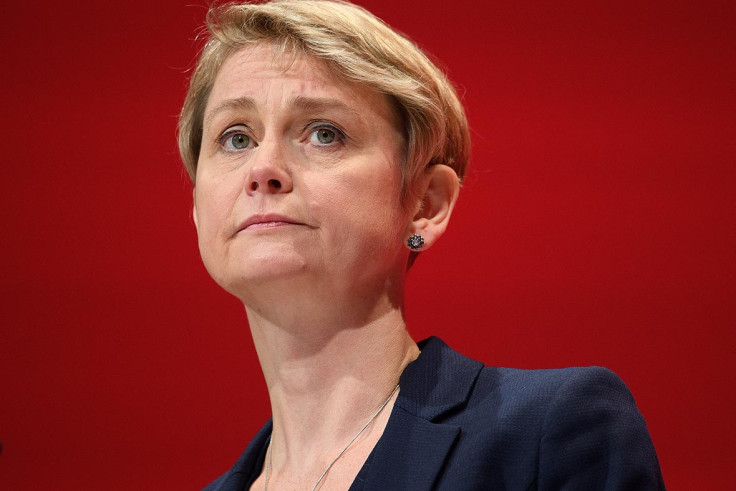
Yvette Cooper, former cabinet minister (and wife of dance star Ed Balls), has issued her response to the event.
She said: "The Prime Minister is right to say that 'in security terms a failure to reach agreement would mean our cooperation in the fight against crime and terrorism would be weakened'.
"But that means her willingness to walk away with no deal if she does not get the deal she wants would not only be wrong but dangerous. She should not be trying to use this as a bargaining chip in the negotiations.
"This is not a threat to the rest of Europe, it would be a serious act of self-harm. She should rule out now walking away with no security deal as our national security and public safety depend on it."
Theresa May's speech to the Commons was noted for lacking the "no deal is better than a bad deal" rhetoric that has previously been central to her position.
The BBC's Laura Kuenssberg tweets that there is no change in policy.
PM spokesman says position on being willing to walk away with no deal has not changed even tho tone very different
— Laura Kuenssberg (@bbclaurak) March 29, 2017
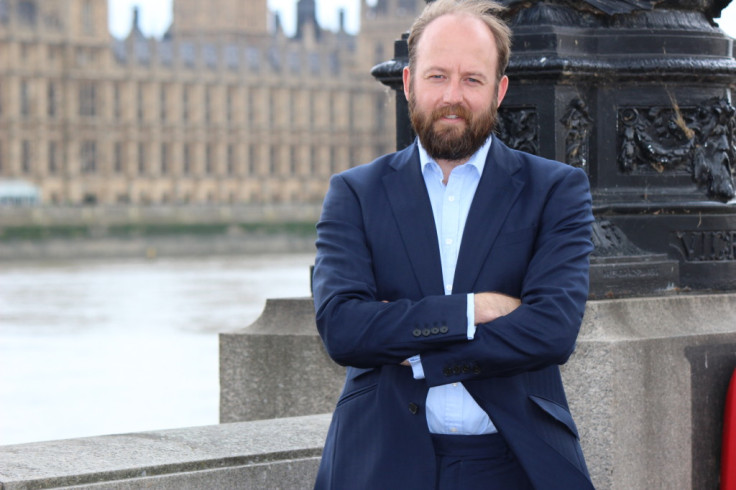
Britain's Brexit negotiators are unlikely to get down to business until late May or early June. Nick Timothy is expected to play a lead role in shaping the UK strategy.
There will be a new French president in place by then. Polls suggest it will be Emmanuel Macron, although Marine Le Pen will be hoping that the populist surge that provided Donald Trump and the Leave campaign with shock results will do the same for her.
The week ahead...
The government is tomorrow expected to publish a white paper on forthcoming legislative changes in the wake of triggering Article 50.
On Friday President Tusk will send a "guidelines" document to the remaining 27 member states. This will provide them with the EU's plans and aspirations for the negotiation process while emphasising unity.
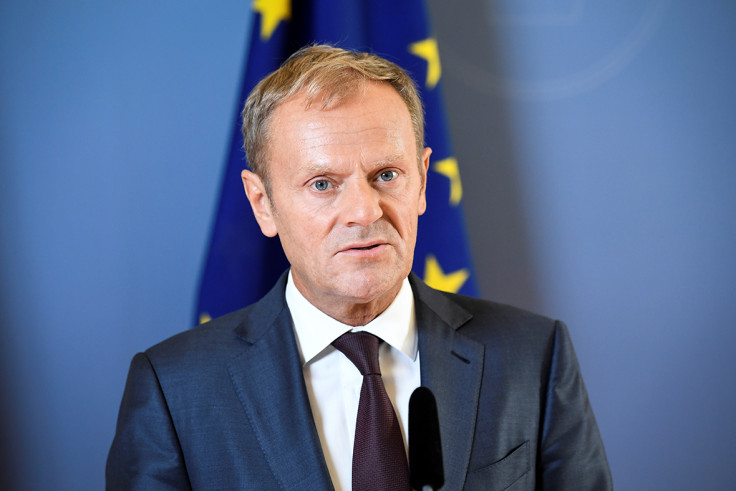
IBTimesUK's Shane Croucher has been keeping his eye on social media as the day unfolds.
His conclusion: "Remainers aren't taking Brexit Day very well."
Ignore the pointless piece of theatre from May re the Article 50 trigger letter. #Brexit will be stopped.
— A C Grayling (@acgrayling) March 28, 2017
The British Chambers of Commerce have commented on the announcement that the UK has triggered Article 50.
They say: "Now that Brexit negotiations are set to begin, businesses across the UK and their trading partners in Europe want answers to practical questions, not political posturing.
"A pragmatic and grown-up dialogue on the real-world issues, rather than verbal volleys between London and Brussels, would give firms greater confidence over the next two years.
"In the early weeks of the negotiation process, businesses would like to see an effort to secure simultaneous exit and trade talks. Concluding exit and trade negotiations at the same time would moderate adjustment costs for UK businesses, and enable trade between UK and EU firms to continue with less disruption."
Dan Cancian from our business desk reports that the pound has surged in the immediate aftermath of Theresa May's announcement to the House of Commons.
Meanwhile the Confederation of British Industry have released a statement, which reads: "This is a pivotal moment in our history and the time to be ambitious, level-headed and confident.
"It is in the interests of businesses across Europe to work together in absolute determination to make a success of Brexit."
German Foreign Minister Gabriel's message to the UK after the triggering of Article 50 is "Let's remain friends."
German FM @sigmargabriel's clear message to the Brits: Let's stay friends. #Brexit negotiations will be carried out without acrimony pic.twitter.com/vaZcptd3vf
— DW | Politics (@dw_politics) 29 March 2017
In August, Gabriel said that the UK could not expect to just "keep the nice things" of EU membership post-Brexit, and the EU risks going "down the drain" if more countries vote to leave.
Columnist James Bloodworth has called on Remainers to "stop sounding like they want Brexit Britain to fail" in his latest article for IBTimes UK.

Trades Union Congress General Secretary Frances O'Grady has called on Prime Minister Theresa May to get the "best Brexit deal for working people."
She said: "The best deal will guarantee that hardworking Brits keep their hard-won rights at work – and that in the years to come they won't miss out on new protections that Dutch, Spanish and German workers get. It must protect good jobs, with decent wages, by keeping our trade free from tariffs and unnecessary bureaucracy. And it must end the disgraceful uncertainty for workers from other EU nations who've made the UK their home.
"The Brexit deal will define Britain's future for a generation. We owe it to ourselves and our children to take the time needed to get it right."
IBTimes UK's Ian Silvera has a full report on Donald Tusk's 'thank you and goodbye' statement on the UK's triggering of Article 50.
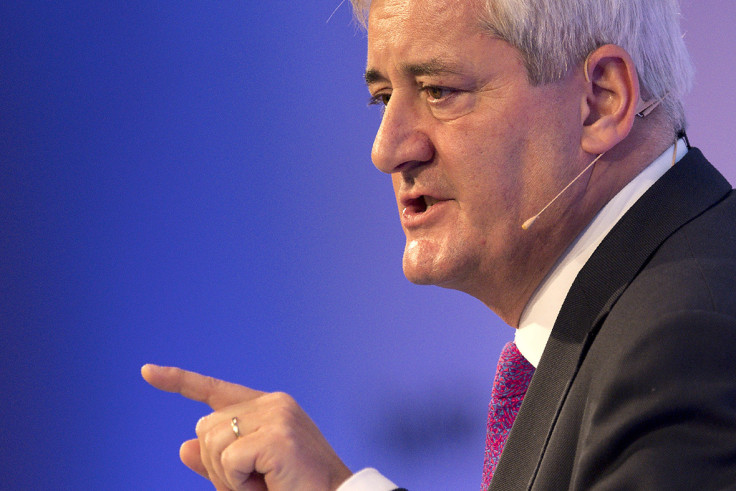
The Confederation of British Industry has described the triggering of Article 50 as a "pivotal moment in the country's history."
Ahead of the June 23 referendum the CBI's director general, Carolyn Fairbairn, warned that leaving the EU would cause a serious shock to the UK economy,
Paul Drechsler, CBI President, said: "We welcome the Prime Minister's commitment to free trade and European values which should hearten those around the table and set a constructive tone at the start of the negotiations.
"This is a pivotal moment in our history and the time to be ambitious, level-headed and confident.
"It is in the interests of businesses across Europe to work together in absolute determination to make a success of Brexit
"Our shared aim must be to forge a mutually beneficial deal that delivers barrier-free trade and safeguards prosperity for all. The Prime Minister has recognised this."
He said securing "early wins" was essential.
"The first six months are crucial as the UK heads into these challenging and unprecedented negotiations. Securing some early wins is therefore vital to set us on the right path.
"Most welcome of all would be the immediate guarantee of the right to remain for EU citizens here and UK nationals in Europe, which all governments agree is desirable.
"Businesses will welcome the upfront commitment to an implementation period to rule out cliff-edges for firms on both sides of the Channel – though more detail will be needed. Meanwhile, we must work constructively to design a means to maintain some influence over regulations affecting UK businesses in our biggest market.
"And discussing new trading arrangements should go hand-in-hand with negotiating the UK's exit from the EU.
"It will be important to deliver on the commitment to include the devolved nations and all regions of the UK in the discussions."
"Business has a crucial role to play in making the economic case as the negotiations progress so we can be clear about the impact on real people, jobs and communities across the UK.
"We know there'll be a lot of noise, which is why the CBI will continue to work closely with the Government and our partners across Europe to ensure the economic case is heard loud and clear."
Theresa May's speech to Parliament and her letter to Donald Tusk both contained this passage:
"We understand that there will be consequences for the UK of leaving the EU. We know that we will lose influence over the rules that affect the European economy.
"We know that UK companies that trade with the EU will have to align with rules agreed by institutions of which we are no longer a part, just as we do in other overseas markets."
Added to May's reaffirmation that we will be leaving the single market, it would appear that Britain has not veered away from the course of a so-called "hard Brexit".
The tensions that we have seen played out on the streets and in UK and Scottish Parliaments are not going anywhere soon. Despite May's best efforts, the frame of the debate has not shifted.
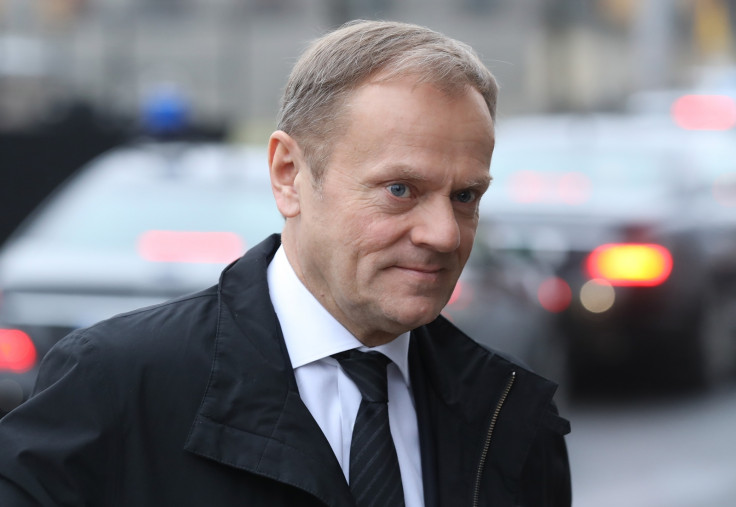
"President of the EU Council Donald Tusk's immediate response to the Article 50 letter:
"Today, the European Council received a letter from the British Prime Minister, Theresa May, notifying the United Kingdom's intention to leave the European Union. This notification follows the referendum of 23 June 2016 and starts the withdrawal process under Article 50 of the Treaty. We regret that the United Kingdom will leave the European Union, but we are ready for the process that we now will have to follow.
"For the European Union, the first step will now be the adoption of guidelines for the negotiations by the European Council. These guidelines will set out the overall positions and principles in light of which the Union, represented by the European Commission, will negotiate with the United Kingdom.
"In these negotiations the Union will act as one and preserve its interests. Our first priority will be to minimise the uncertainty caused by the decision of the United Kingdom for our citizens, businesses and Member States. Therefore, we will start by focusing on all key arrangements for an orderly withdrawal.
"We will approach these talks constructively and strive to find an agreement. In the future, we hope to have the United Kingdom as a close partner."
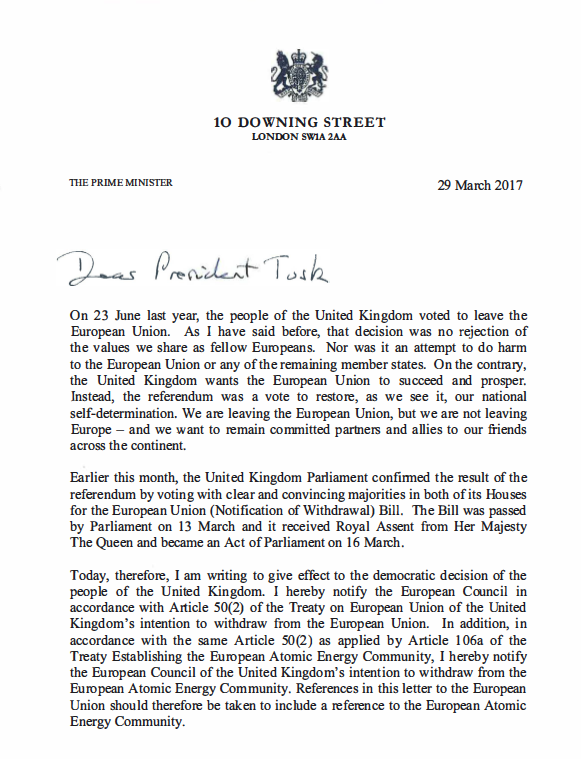






Read the full text of the Article 50 letter sent to the European Union in the last half an hour. The full text is here.
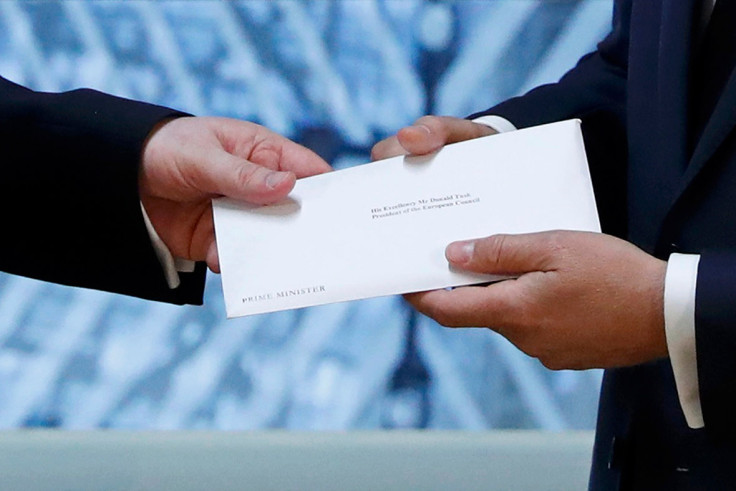
IBTimes UK has just seen a copy of the letter handed to Donald Tusk. It begins by announcing Britain's intention to trigger Article 50 of the Lisbon Treaty before moving into some detail about May's vision for future UK-EU relations.
She outlines seven principles upon which she believes the negotiations should be conducted:
- We should engage with one another constructively and respectfully, in a spirit of sincere cooperation.
- We should always put our citizens first.
- We should work towards securing a comprehensive agreement.
- We should work together to minimise disruption and give as much certainty as possible.
- In particular, we must pay attention to the UK's unique relationship with the Republic of Ireland and the importance of the peace process in Northern Ireland.
- We should begin technical talks on detailed policy areas as soon as possible, but we should prioritise the biggest challenges.
- We should continue to work together to advance and protect our shared European values.
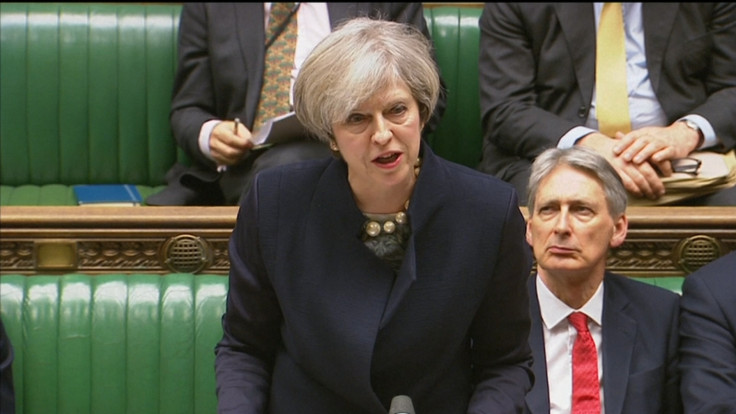
Theresa May is now giving a speech to the Commons announcing that her letter has made its way into the hands of Donald Tusk.
She has told fellow MPs that Britain is not turning its back on Europe, saying: "Perhaps now more than ever the world needs the liberal, democratic values of Europe - values that the UK shares."
She said: "This is an historic moment from which there can be no turning back. Britain is leaving the European Union. We're going to make our own decisions and our own laws, we're going to take control of the things that matter most to us. And we're going to take this opportunity to build a stronger and fairer Britain that our children and grandchildren are proud to call home."
The prime minister said the UK would be leaving the single market and she hoped for a "smooth and orderly Brexit".
Article 50 of the Lisbon Treaty has been triggered. Britain has taken its first official step towards leaving the EU.
British ambassador Sir Tim Barrow has just handed a letter to President of the European Council Donald Tusk that was signed and sealed by Theresa May last night.
It announces the UK's intentions to leave the EU on 30 March 2019. Over the next two years there will be fraught negotiations between Britain and the remaining 27 states as they attempt to hammer out a new formal relationship, avoiding the metaphorical "cliff edge Brexit".
After nine months the UK has delivered. #Brexit
— Donald Tusk (@eucopresident) March 29, 2017
Meanwhile, outside Parliament...
Anti Brexit protest on Whitehall today pic.twitter.com/fz71O3fjrz
— Jack Doyle (@jackwdoyle) March 27, 2017
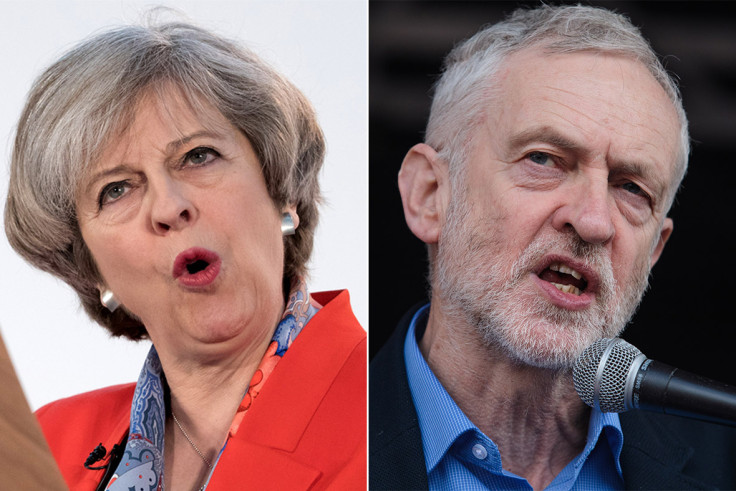
At PMQs Corbyn has taken May to task for cuts to police and school spending. May accuses Labour of being fiscally irresponsible.
The SNP's Angus Robertson takes up the issue of Brexit up with the prime minister and, in particular, the SNP's desire to break away from the UK if Scotland cannot be guaranteed preferential access to the single market.
May responds by referring to the SNP as the Scottish Nationalist Party, presumably mistakenly. And the Scots MPs go wild! It takes a good half a minute for Speaker John Bercow to calm them down
SNP very irritated by Theresa May calling them The Scottish Nationalist Party, not the Scottish National Party
— James Forsyth (@JGForsyth) March 29, 2017
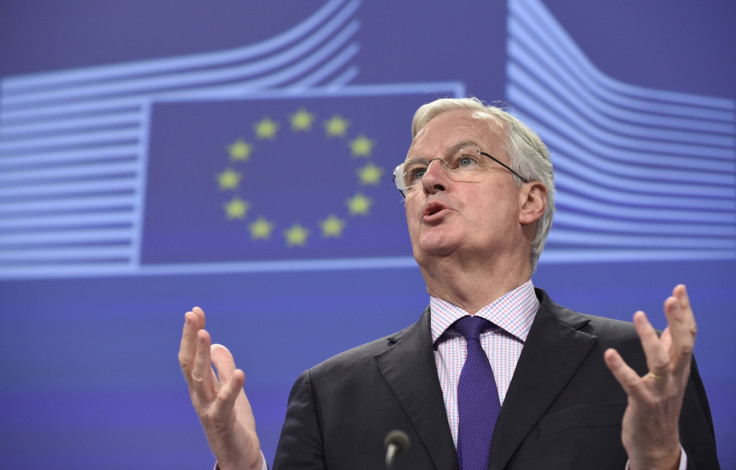
Michel Barnier, the man leading the Brexit negotiations on behalf of the EU, says he is "ready".
He told the Financial Times (paywall) : "I am ready. I want to succeed, I want to get a deal."
The former French Foreign Minister added that there were conditions "in the common interest of the UK and the EU".
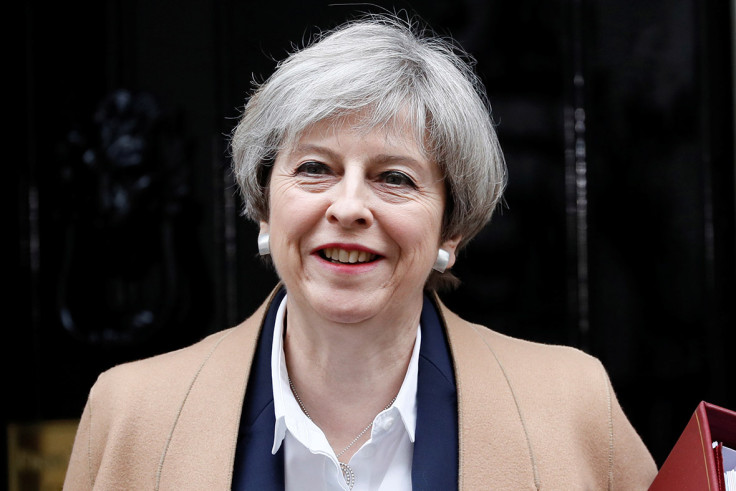
PMQs has kicked off in the House of Commons.
Jeremy Corbyn and Theresa May pay tribute to the emergency services and their response to the Westminster terror attack last Wednesday.
Corbyn presses May on police cuts while May insists that the police budget has been protected.
Will Corbyn tackle Brexit today?
2/ 69% of people think Brexit should go ahead – only 21% want to see the referendum result ignored or overturned https://t.co/JovdJwbpMf pic.twitter.com/V2EJuagkXl
— YouGov (@YouGov) March 29, 2017
No Bregrets! A YouGov poll has found that 69% of people want Brexit to go ahead while only 21% want to see the referendum result overturned. If the poll is correct, then Britain is markedly more pro-Brexit now than it was on 23 June when the vote was split 52/48.
Shadow Defence Secretary @NiaGriffithMP talks to me about #BrexitDay pic.twitter.com/y7gSlMBB3i
— Ian Silvera (@ianjsilvera) March 29, 2017
"It's really important now that the prime minister gets down to work," UKIP Shadow Defence Secretary Nia Griffith tells IBTimesUK.

Business news: Pernod Ricard, the owner of Absolut vodka and Martell cognac, has blamed its decision to lift prices on spirits and wines in the UK on the need to offset the pound's sharp slump.
The pound went into freefall in the aftermath of the 23 June Brexit referendum. It remains around 15% lower today than it was before the vote.
They said: "Brexit is leading to a strong pound depreciation, with inflation expected higher as a reaction. In that context, Pernod Ricard increased prices in March."
. @prwhittle tells me UKIP is here to stay and he's very happy for #BrexitDay pic.twitter.com/aWQkyFLhlM
— Ian Silvera (@ianjsilvera) March 29, 2017
IBTimesUK's man in Westminster Ian Silvera has caught up with UKIP Deputy Leader Peter Whittle.
Whittle said he was "thrilled" that the day had finally come but warned that the government needed to "make sure that what people voted for is what they get".
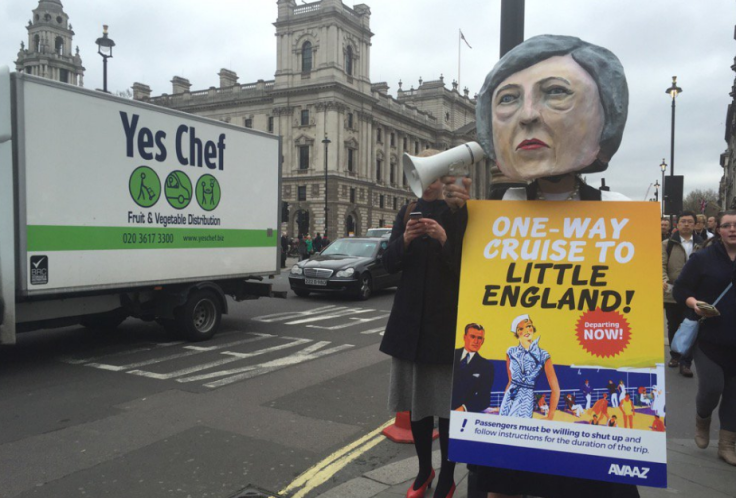
This photo of an anti-Brexit protester sums up the fears of many people who voted to Remain in the EU. Will the UK's withdrawal usher in a new era of isolationism?
The government say it will not. This morning IBTimes UK confirmed that Britain is in "high-level dialogues" with at least fifteen countries around the world as it embarks on forging new trade deals.
Just spoke to this lady handing out Open Britain leaflets in Westminster # BrexitDay pic.twitter.com/PSemLSpoaZ
— Ian Silvera (@ianjsilvera) March 29, 2017
Our senior politics reporter Ian Silvera has been speaking to people around Westminster this morning including this women handing out Open Britain leaflets.
She told him that she respected the referendum result but wanted to "make sure that Britain gets the best deal". She added: "If they [the government] can't deliver then they must be held to account."
She preferred not to give her name but said she was from London and that she had been received warmly by people she had met on the street.
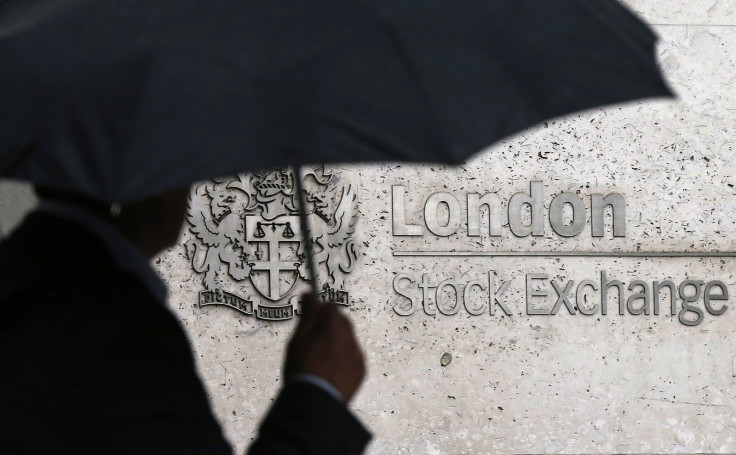
Indirectly related business news now: The European Commission has blocked the merger of the London Stock Exchange and Deutsche Börse.
It is the third time in 17 years that the Anglo and German stock exchanges have tried to merge.
EU competition commissioner Margrethe Vestager said: "The merger would have led to a de facto monopoly in clearing of fixed income instruments."
When Britain leaves the EU what should the government look to bring back? @YouGov provided the list and this is what we found. #BrexitDay pic.twitter.com/uL1jX2PzT1
— Joe Twyman (@JoeTwyman) March 29, 2017
YouGov have produced an eye-opening poll asking Britons about what they want to see change when the UK leaves the EU.
The death penalty, corporal punishment and incandescent light bulbs ranked high on the list.
The poll was conducted in February and was tweeted today by Joe Twyman, Head of Political and Social Research for Europe at YouGov.

Protesters have started gathering outside Parliament with only hours to go before the UK invokes Article 50.
It is a week to the day since Westminster was on lockdown after Khalid Masood entered the estate and stabbed PC Keith Palmer to death. MPs and other staff were told to remain in their offices while armed police conducted a full search of the area.
On Saturday thousands gathered in Parliament Square to protest again Article 50 and the Brexit process.
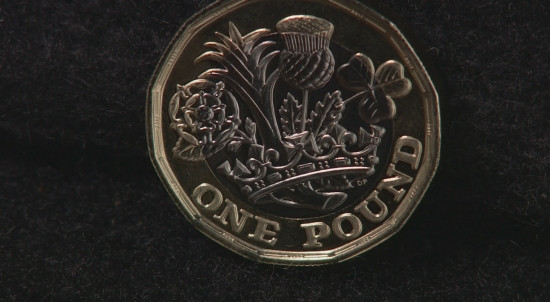
The pound was on the back foot against the dollar as Britain triggered Article 50 and began the formal process of leaving the European Union.
Halfway through the morning session, sterling was trading at $1.2444, having fallen to as low as $1.2378 earlier in the session. That was over two cents lower than the two-month high it hit against the US dollar on Monday.
Meanwhile, sterling was 0.46% higher against the euro, trading at €1.1535 and seemingly defying doom and gloom predictions for the time being.
"A truly hard Brexit has not been priced into sterling," said ETX Capital analyst Neil Wilson.
"We could see it move lower still if negotiations take a sour turn - $1.10 is feasible.
"The old hard v soft Brexit debate is once again central to expectations for the pound. Sterling will rise on any indications of a softer Brexit and fall on any signs it's going to be hard. If we head towards a cliff-edge then it could collapse.
"We are likely to see a lot of toing and froing between the various Brexit scenarios."
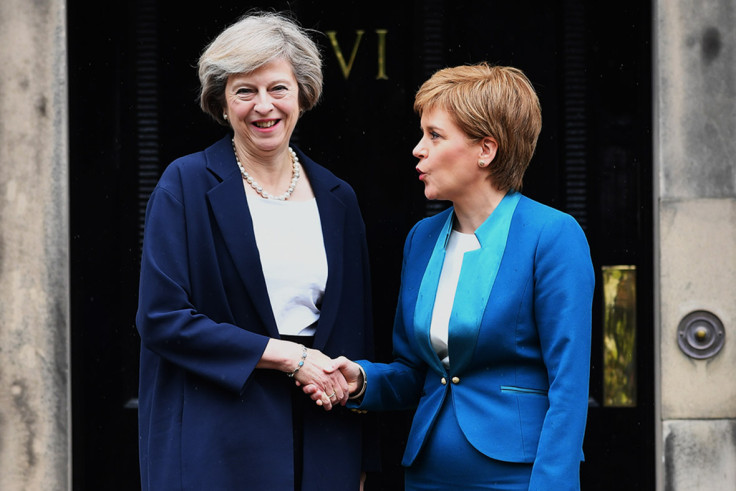
The very future of the United Kingdom is going to loom large in the background as it departs from the EU. The Scottish National Party believe that Brexit has provided justification for a fresh Scottish Independence referendum.
Theresa May has told Sturgeon that "now is not the time" to revisit the question of Scottish independence but the issue is not going away
Our columnist James Kelly thinks Nicola Sturgeon is a right to demand a fresh plebiscite. He says: "May has taken out a hedged bet – and as things stand, she appears to be onto a loser."
.
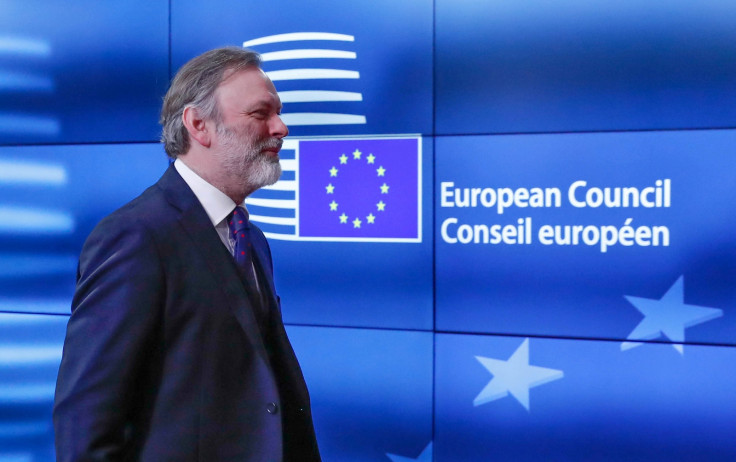
Who is Sir Tim Barrow?
Our senior politics reporter Ian Silvera has written a comprehensive profile of the 53-year-old British ambassador to the EU.
A former Director of the Foreign Office to Brussells, Sir Tim was parachuted into the ambassadorial role after Sir Ivan Rogers quit in somewhat acrimonious circumstances.
Theresa May will call for unity later today in a speech to be delivered after PMQs.
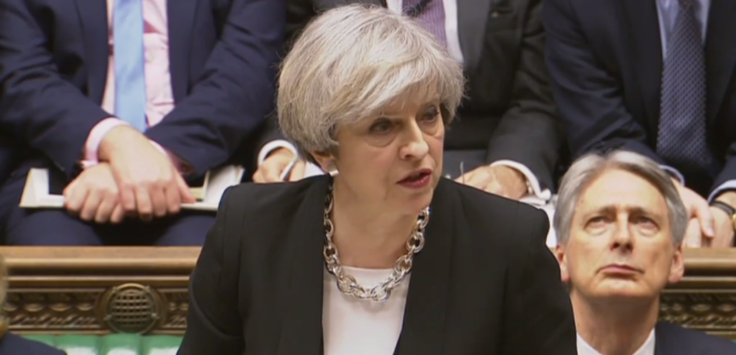
She will pledge her "fierce determination" to get the best Brexit deal for everyone in the UK.
Meanwhile, opposition leader Jeremy Corbyn has vowed to respect the result of the referendum and the triggering of Article 50 while promising to hold the government to account during negotiations.
"The Brexit deal will define Britain's future for a generation. We owe it to ourselves and our children to take the time needed to get it right," he said.
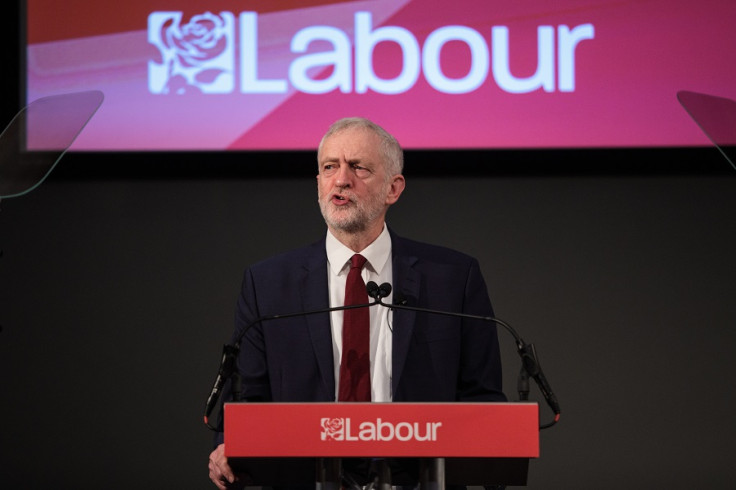
This briefcase contains the letter signed by Theresa May last night, which announces Britain's decision to invoke Artlicle 50 and leave the European Union.
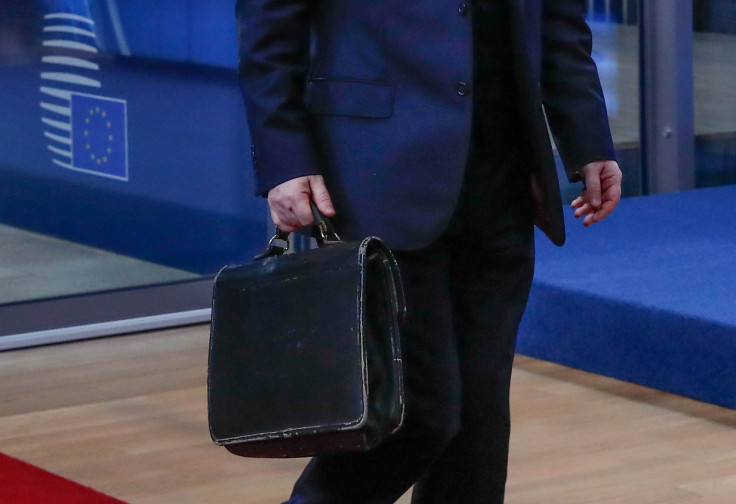
It is being carried by Sir Tim Barrow, Britain's ambassador to the EU, to be delivered to Donald Tusk this afternoon.
Among the pick of this morning's front pages are The Guardian and The Daily Mail.
Unsurprisingly, they approach the triggering of Article 50 with contrasting attitudes: for The Guardian, "Britain steps into the unknown", while for the Mail, it's simply "Freedom!"
Paul Dacre's title juxtaposes a picture of May signing the Article 50 letter with Sgt Alexander Blackman, formerly Marine A's, wife outside the Royal Courts of Justice.
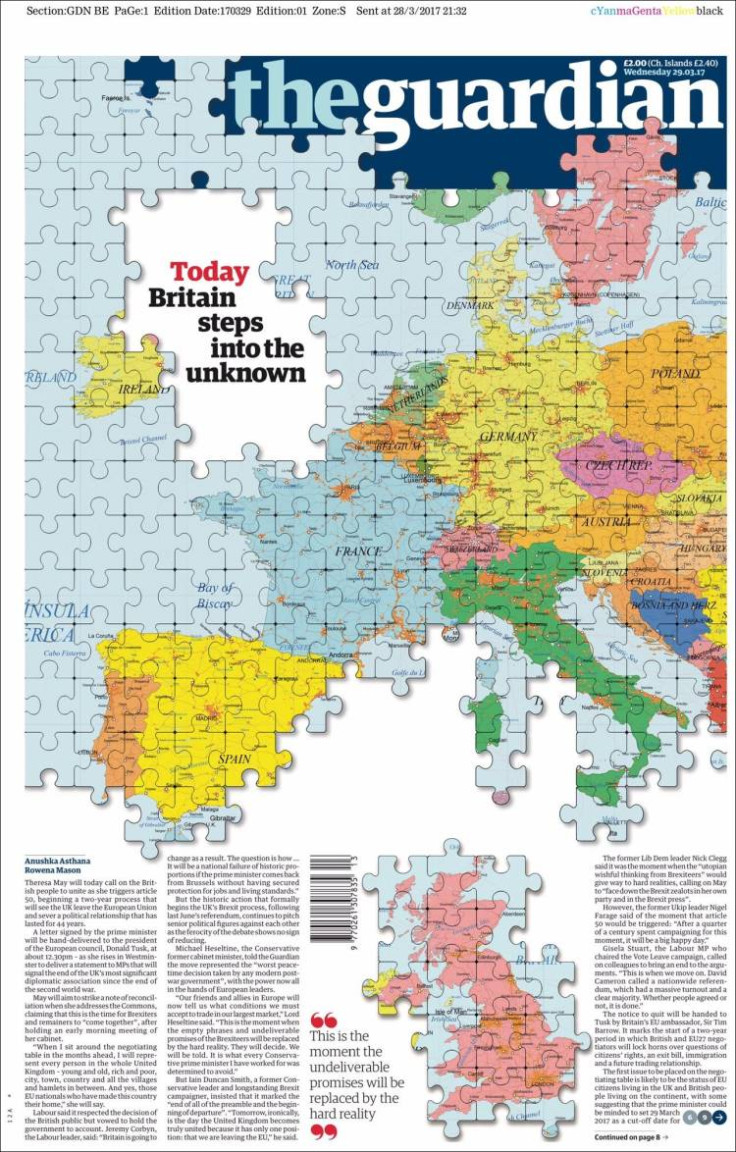
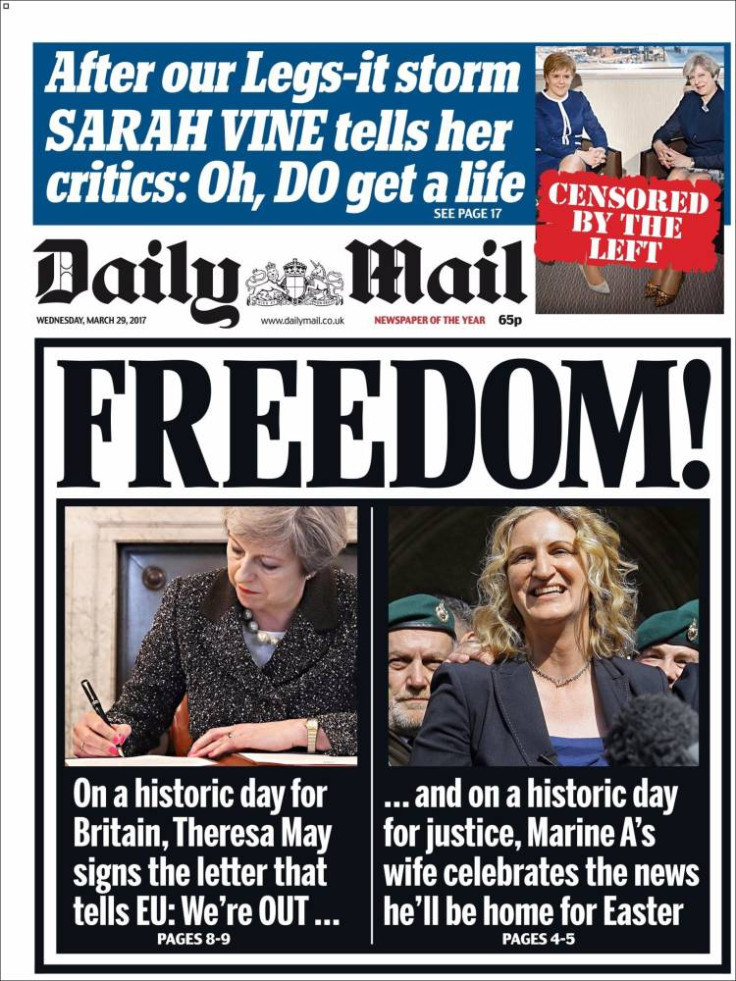
The man with the Article 50 letter, Sir Tim Barrow, has arrived in at the Europa building in Brussels.
Sir Tim Barrow, the UK's ambassador to the EU, enters the Europa building in Brussels with Theresa May's Article 50 letter#BrexitDay pic.twitter.com/4ot6CNA78P
— Press Association (@PA) March 29, 2017
Sir Tim exited his car carrying a small briefcase, let's hope he remembered that one important document!
Donald Tusk has tweeted that he expects to receive the UK government's letter triggering Article 50 early this afternoon.
At 13.20 today, UK #Brexit notification letter (article 50) will be handed to me by Ambassador Tim Barrow: https://t.co/HYCdJfmuLH pic.twitter.com/FBcAx8MSon
— Donald Tusk (@eucopresident) March 29, 2017
Tusk also shared his schedule for the week, which includes meetings with the Ukranian and Croatian premiers. The message would seem to be that life inside the remaining EU-27 goes on.
This morning IBTimes UK confirmed that Britain was in "high-level dialogues" with at least 15 other countries.

Brexiteers are optimistic that the UK will prosper outside of the customs zone by forging ambitious trade deals with the rest of the world.
Theresa May's determination to regain control of our borders means it is likely that Britain will lose preferential access to the single market. In simple terms, this choice can be characterised as one between a soft and a hard Brexit.
IBTimes UK have provided an explainer for these terms.
In a moment we will look at today's papers but first it might be worth reflecting again on yesterday's much talked about Daily Mail front page.
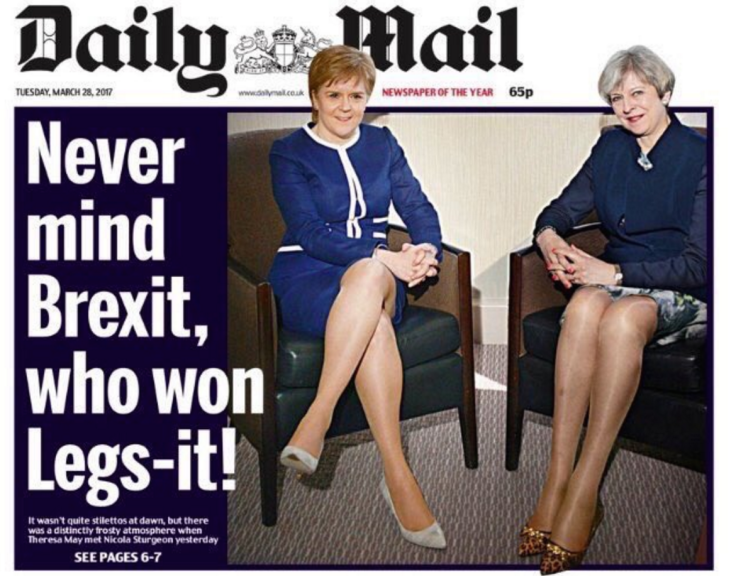
Editor Paul Dacre came under fire for focusing on Theresa May and Nicola Sturgeon's legs . The pair met on Wednesday to discuss, among other things, the timing of a second Scottish independence referendum.
Last night Scottish MPs voted 69 to 59 to back Sturgeon's plans for a second independence vote.
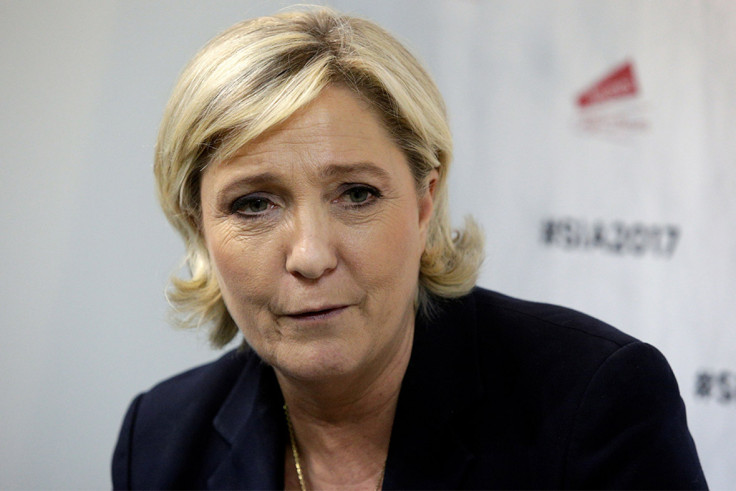
Last night Marine Le Pen claimed that the EU wanted to punish the UK for leaving the bloc. She said: "The EU wants the divorce to be as painful as possible."
A recent Ipsos poll found that Le Pen is likely to win the first round of the French election with 25% of the vote. However, she would then be expected to lose to Emmanuel Macron in the second round.
© Copyright IBTimes 2025. All rights reserved.


